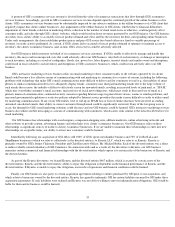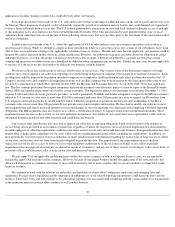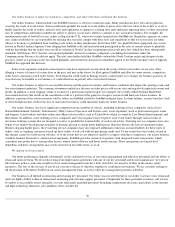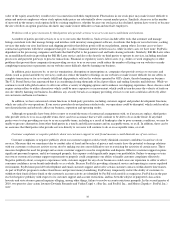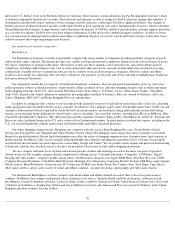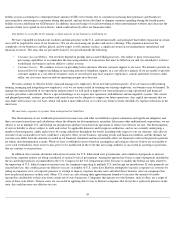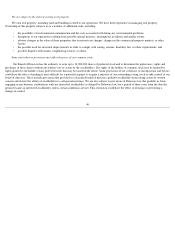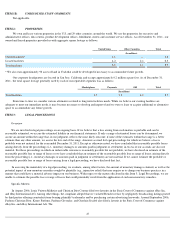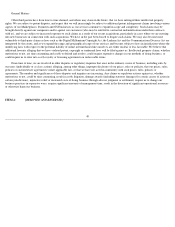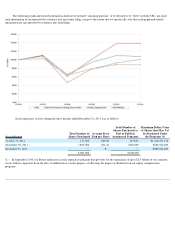eBay 2011 Annual Report Download - page 47
Download and view the complete annual report
Please find page 47 of the 2011 eBay annual report below. You can navigate through the pages in the report by either clicking on the pages listed below, or by using the keyword search tool below to find specific information within the annual report.
the Interpublic Group of Companies); and other interactive marketing services (e.g., Google, LinkShare (owned by Rakuten), TradeDoubler, and
ValueClick). Low barriers to entry in the interactive marketing industry could also increase the number of competitors our interactive marketing
services business may face.
We believe that we compete with interactive marketing services competitors primarily on the basis of the following:
Our ecommerce services and interactive marketing services businesses have competitors with longer operating histories, larger customer
bases, greater brand recognition and greater financial, marketing and other resources. Those competitors may be able to secure components of
their technology and services on more favorable terms and devote more resources to technology development and marketing than our ecommerce
services and interactive marketing services business. In addition, as we expand our ecommerce services and interactive marketing services
businesses internationally, we will face increased competition from local companies which may have a greater understanding of, and focus on, the
local customer.
We are subject to regulatory activity and antitrust litigation under competition laws.
We receive scrutiny from various government agencies under U.S. and foreign competition laws. Some jurisdictions also provide private
rights of action for competitors or consumers to assert claims of anti-competitive conduct. Other companies and government agencies have in the
past and may in the future allege that our actions violate the antitrust or competition laws of the U.S. or other countries, or otherwise constitute
unfair competition. Contractual agreements with buyers, sellers, or other companies could give rise to regulatory action or antitrust litigation.
Also, our unilateral business practices could give rise to regulatory action or antitrust litigation. Some regulators, particularly those outside of the
U.S., may perceive our business to have so much market power that otherwise uncontroversial business practices could be deemed
anticompetitive. For example, in the U.S., we have been sued by a plaintiff representing a putative class of sellers who alleges that we have
illegally monopolized a market for online auctions. In Korea, the national competition authority has investigated allegations that we have engaged
in illegal exclusive conduct and rendered a decision against us in October 2010. The case is on appeal through two administrative lawsuits, and a
further investigation has now been concluded by the Seoul prosecutor's office, which has chosen not to bring any charges. The competition
authorities in Germany and Australia have conducted investigations (now completed) of various actions taken by our businesses. Such claims and
investigations, even if without foundation, typically are very expensive to defend, involve negative publicity and substantial diversion of
management time and effort, and could result in significant judgments against us.
In several jurisdictions, we have taken actions designed to improve the security of transactions and the quality of the user experience on our
websites. Beginning in June 2008, we have required users in the U.K. to offer PayPal as a payment alternative on most transactions on our
localized U.K. website, and since October 2008, we have required sellers on eBay.com to accept one or more accepted payment methods
(currently PayPal, credit or debit cards processed through Internet merchant accounts, ProPay, Moneybookers and Paymate) and no longer allow
any forms of paper payment, including checks and money orders, to be listed by sellers in the U.S. for most categories of items. While these
initiatives are intended to improve and make safer our users' buying experience and/or increase activity on our sites, certain users may be
negatively affected by or react negatively to these changes, and may allege that we have (and are abusing) market power. We currently face
inquiries from government regulators in various jurisdictions related to such actions. For example, in 2008, both the Australian Competition and
Consumer Commission and the Reserve Bank of Australia reviewed our policies requiring sellers to offer PayPal as a payment alternative on most
transactions on our localized Australian website and precluding sellers from imposing a surcharge or any other fee for accepting PayPal or other
payment methods. We may face similar inquiries from other government regulators in the future. Negative reactions to these changes by our users
or government authorities could, among other things, force us to change our operating practices in ways that could harm our business, operating
results and profitability.
Our business may be adversely affected by factors that cause our users to spend less time on our websites, including seasonal factors,
national events and increased usage of other websites.
Anything that diverts our users from their customary level of usage of our websites could adversely affect our business. We would therefore
be adversely affected by geopolitical events such as war, the threat of war, or terrorist activity, and natural disasters, such as hurricanes or
earthquakes. Similarly, our results of operations historically have experienced seasonal fluctuations because many of our users reduce their
activities on our websites with the onset of good weather during the summer months, and on and around national holidays. In particular, our GSI
business is highly seasonal, with the fourth quarter
42
• offering digital marketing solutions that are integrated with our ecommerce services platform, which we believe provides a more
strategic, cohesive and optimized approach to growing ecommerce businesses; and
• providing services that utilize proprietary technology to promote stronger customer engagement designed to increase clients' return on
investment.



